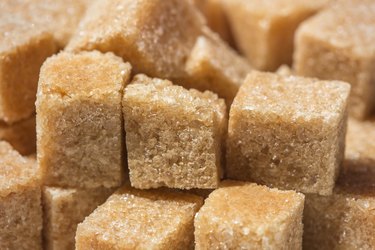
Are you wondering whether brown sugar is better for you than white sugar when you want to eat a sweet treat but need to control your blood sugar levels? Before you grab that dessert, here's what you need to know about brown sugar and diabetes.
Video of the Day
Video of the Day
Brown Sugar and Blood Sugar Levels
According to the U.S. National Library of Medicine (NLM), brown sugar is a combination of table sugar and molasses, which provides it with its unique texture and brown color. It has a deeper, more caramel-like flavor than regular sugar, which creates a richer taste in some baked goods.
However, molasses is yet another form of sugar, so just like white sugar, it's a carbohydrate. That's the macronutrient with the largest effect on your blood sugar levels, according to the Centers for Disease Control and Prevention. Blake Metcalf, RD, CDE, a registered dietitian and certified diabetes educator with Morrison Healthcare in Fort Smith, Arkansas, explains, "It really isn't any different than any other type of sugar from a nutrition standpoint."
According to the USDA, one teaspoon of brown sugar has:
- Calories: 17.5.
- Protein: 0 grams.
- Fat: 0 grams.
- Carbs: 4.51 grams.
White sugar is very similar based on USDA data; a teaspoon comes with 16.2 calories and 4.2 grams of carbohydrates. So, nutritionally, there's very little difference between white and brown sugar.
Because your overall meal composition also affects blood sugar levels, if you want to occasionally eat a sugary treat or dessert, have it with some protein or fat to slow down the blood sugar rise. In general, making a habit of maintaining a balance of protein, carbs and fat at every meal and snack should help reduce or prevent blood sugar spikes when you have diabetes, according to a January 2016 study in Diabetes, Obesity and Metabolism, and that's good for overall diabetes self-care.
Added Sugars and Diabetes
Like white sugar, brown sugar is considered an added sugar, according to the NLM, as opposed to naturally occurring sugars found in foods like fruits, vegetables, whole grains and dairy products.
According to a December 2017 review in the Chinese Journal of Dental Research, high added sugar consumption may contribute to weight gain, tooth decay and the development of chronic diseases like type 2 diabetes or heart disease. Additionally, according to a January 2018 study in the British Journal of Nutrition, added sugar may be linked to depression.
"It's recommended that people keep added sugars to less than 10 percent of total calories," Metcalf says. The World Health Organization takes it a step further, recommending a daily limit of added sugar of just 5 percent of your calories or less for the largest health benefit.
"Most importantly," Metcalf explains, "a person's blood sugar control and lifestyle habits will ultimately need to be considered before making decisions about when and how often it is appropriate to consider eating added sugars."
Sugar Substitutes for Diabetes Baking
If you'd like to replicate the taste of brown sugar without its blood sugar-spiking effects, there are several alternatives that you can use, often made with sucralose or stevia, according to the Cleveland Clinic. Some sweetener brands offer a brown sugar baking blend, which is usually made from 50 percent brown sugar and 50 percent zero-calorie sweetener.
There are also some zero-calorie sweeteners that can be used as standalone alternatives to brown sugar. They're 100 percent calorie- and carb-free, but may contain added flavors and colors to help match the taste and appearance of brown sugar.
Note that while sweeteners like honey, molasses and maple syrup may seem like potentially good alternatives to brown sugar, they're all considered sugars and will have similar effects on your blood sugar levels as brown and white sugar, according to the NLM.
- American Diabetes Association: “Types of Carbohydrates”
- Blake Metcalf, RD, LD, CDE, registered dietitian, certified diabetes educator, Morrison Healthcare, Fort Smith, Arkansas
- British Journal of Nutrition: “Added Sugars and Sugar-Sweetened Beverage Consumption, Dietary Carbohydrate Index and Depression Risk in the Senguimiento Universidad de Navarra (SUN) Project”
- Centers for Disease Control and Prevention: “Manage Blood Sugar”
- Chinese Journal of Dental Research: “A Review of excessive Sugar Metabolism on Oral and General Health”
- Diabetes, Obesity and Metabolism: “Mixed Meal Ingestion Diminishes Glucose Excursion in Comparison With Glucose Ingestion via Several Adaptive Mechanisms in People With and Without Type 2 Diabetes”
- USDA: “Sugar, Brown”
- USDA: “Sugar, White, Granulated or Lump”
- U.S. National Library of Medicine: “Sweeteners – Sugars”
- World Health Organization: “WHO Calls on Countries to Reduce Sugars Intake Among Adults and Children”
- Cleveland Clinic: “Sugar Substitutes and Non-Nutritive Sweeteners”